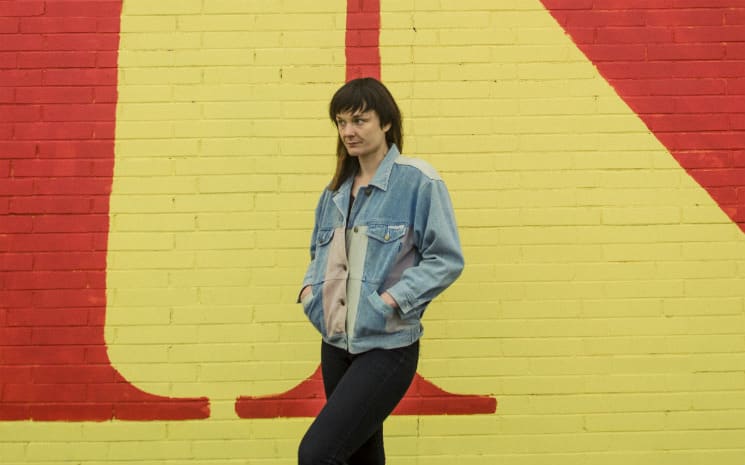Liz Powell has always been curious. "Left to my own devices, I tend to just enjoy curiosity," she says, warmth detectable through the phone. It's been seven years since Powell last released music with her indie rock project Land of Talk, and it's clear that inquisitiveness and a desire to explore still drive her. "It definitely seems like I'm aimless," she laughs of her propensity for exploration. "I don't tend to focus a project with the endgame vision of something — a clean package that can be put on the shelf to sell. I tend to be a bit less focused.
"It's been years of trying to find my place in the world beyond being 'Elizabeth from Land of Talk,'" she explains.
In that way, it's clear that her new Land of Talk record, the stunning Life After Youth, isn't an end, and the past seven years were not merely a means to it. Rather, the relationship seems more coincidental and fateful. This record isn't a product of calculation, but curiosity.
Powell speaks candidly about her time off from music. "It seemed like a natural soft retirement in a weird way," she chuckles. "I was taking a breath and seeing how other people are supposed to live their lives. We can reduce a lot of these down to little sayings or clichés, but the grass is always greener." Powell relates that she was tired of being "Liz Powell, indie rocker, rocker girl, whatever."
"I'm not playing the 'woe is me' card, but when everyone is impressed with you without even talking to you or even asking how you're doing, it's very alienating," she sighs. Though, she admits, "To be misunderstood on that level is a fine price to pay to be able to share my music with people."
The articulate, well-oiled machine of Life After Youth is the product of sporadic and tangential partnerships; a rotating cast of past collaborators and old friends contributed to its creation. "It's true to who I am," she says. "It's a testament to what Land of Talk has been." Indeed, it's long been a labour of love for Powell and her co-conspirators. She excitedly details an evening in the studio with Sharon Van Etten, a night Powell says she'll remember for the rest of her life, even the still quiet of waiting outside the studio for Van Etten's Uber to arrive. "That's what you're never going to hear," she says. "The record is this beautiful artefact of this web of friendship, and all these beautiful little moments that happened."
The album art best encapsulates the core tenet of Life After Youth, behind Powell's work, and perhaps behind all life: a photo of a small, glass globe cradled on the back of Powell's hand. It's the result of a series of photos she was taking, simply of objects in her palm, set against the cream-coloured wall of her hallway. When she picked up the glass globe to shoot it, she felt like trying something different. "Instead of holding it in my hand, I thought, 'I'm going to try and balance it on my knuckles. It was curiosity."
"It's been years of trying to find my place in the world beyond being 'Elizabeth from Land of Talk,'" she explains.
In that way, it's clear that her new Land of Talk record, the stunning Life After Youth, isn't an end, and the past seven years were not merely a means to it. Rather, the relationship seems more coincidental and fateful. This record isn't a product of calculation, but curiosity.
Powell speaks candidly about her time off from music. "It seemed like a natural soft retirement in a weird way," she chuckles. "I was taking a breath and seeing how other people are supposed to live their lives. We can reduce a lot of these down to little sayings or clichés, but the grass is always greener." Powell relates that she was tired of being "Liz Powell, indie rocker, rocker girl, whatever."
"I'm not playing the 'woe is me' card, but when everyone is impressed with you without even talking to you or even asking how you're doing, it's very alienating," she sighs. Though, she admits, "To be misunderstood on that level is a fine price to pay to be able to share my music with people."
The articulate, well-oiled machine of Life After Youth is the product of sporadic and tangential partnerships; a rotating cast of past collaborators and old friends contributed to its creation. "It's true to who I am," she says. "It's a testament to what Land of Talk has been." Indeed, it's long been a labour of love for Powell and her co-conspirators. She excitedly details an evening in the studio with Sharon Van Etten, a night Powell says she'll remember for the rest of her life, even the still quiet of waiting outside the studio for Van Etten's Uber to arrive. "That's what you're never going to hear," she says. "The record is this beautiful artefact of this web of friendship, and all these beautiful little moments that happened."
The album art best encapsulates the core tenet of Life After Youth, behind Powell's work, and perhaps behind all life: a photo of a small, glass globe cradled on the back of Powell's hand. It's the result of a series of photos she was taking, simply of objects in her palm, set against the cream-coloured wall of her hallway. When she picked up the glass globe to shoot it, she felt like trying something different. "Instead of holding it in my hand, I thought, 'I'm going to try and balance it on my knuckles. It was curiosity."
